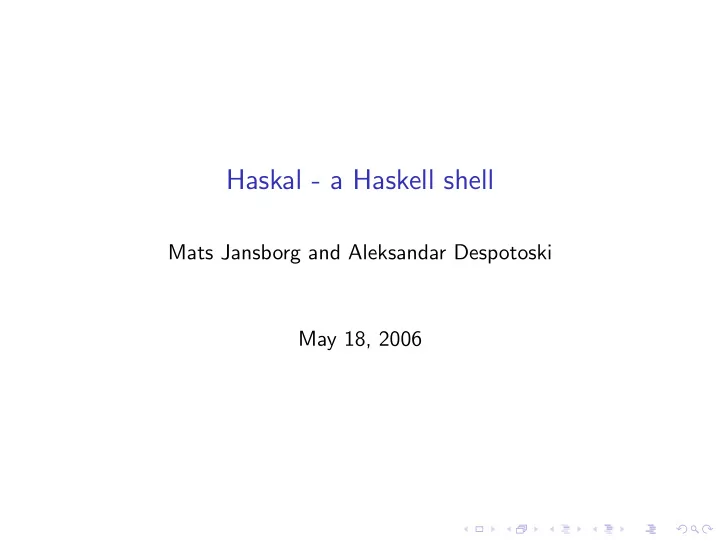

Haskal - a Haskell shell Mats Jansborg and Aleksandar Despotoski May 18, 2006
Why a new type of Shell? ◮ Limited functionality ◮ No type safety
Unix shells as Monads ◮ Where | corresponds to >>= ◮ cat x to return x
Related Work ◮ H4sh ◮ Haskell functions as Programs ◮ http://www.cse.unsw.edu.au/ dons/h4sh.html ◮ Hashell ◮ Uses combining of Haskell commands and shell commands ◮ http://haskell.org/hashell
General Approach ◮ Make System functions available as Haskell functions Example cat :: Program String String ◮ Define operators to compose programs and Haskell functions ◮ Example >|< corresponds to the normal pipe in Shells
General Approach ◮ Importing the programs ◮ Go through the path ◮ Compile the file with all programs (to Object file) ◮ Read User Input ◮ Compile and link together with programs and operators
HS-Plugins ◮ Used for executing Haskell code dynamically ◮ Compiling, linking and running is done by hs-plugins ◮ Works fine for compiling program files, but rather slow for user input.
How to model commands? ◮ Using the monad analogy: instance Monad command where ... echo :: [Arg] -> String -> Command String cat :: [Arg] -> a -> Command a echo [] "foo" >>= cat [] :: Command String ◮ Problem: we need to (de)serialise inputs and outputs
Add support for serialisation ◮ class Marshal a where marshal :: a -> ([Word8] -> [Word8]) unmarshal :: [Word8] -> a marshalList :: [a] -> ([Word8] -> [Word8]) unmarshalList :: [Word8] -> [a]
Commands in Haskal ◮ newtype Command i o = Command [IO ()] class Cmd c where toCommand :: (Marshal i, Marshal o) => c i o -> Command i o ◮ instance Cmd Command where ... instance Cmd (->) where ... instance Cmd Program where .. ◮ newtype DoIO i o = DoIO (i -> IO o) instance Cmd DoIO where ...
Redirection ◮ Combining commands in parallel (>|<) :: (Cmd c1, Cmd c2, Marshal t, Marshal i, Marshal o) => c1 i t -> c2 t o -> Command i o ◮ Redirecting standard output, input and error (>|), (|<), (&>|) :: (Marshal i, Marshal o, Cmd c) => c i o -> String -> Command i o
Example $ls >|< words >|< map length >|< sum 1228 $ls >|< map (dropWhile (/=’.’)) . words >| "file" $cat |< "file" .cabal .hs ...
Name clashes ◮ $ls >|< words >|< map length >|< sum <haskal>:1:32: Ambiguous occurrence ‘sum’ It could refer to either ‘Data.List.sum’, imported from Prelude at Implicit import declaration or ‘P.sum’, imported from P at /tmp/MeZeX10978.hs:2:0-8 ◮ Need to use qualified names $ls >|< words >|< map length >|< Prelude.sum 1228
Command line arguments ◮ Argument is a typeclass too class Argument a where toArgument :: a -> [String] listToArgument :: [a] -> [String] ◮ instance Argument String ... instance Arguemnt (Program i o) ... instance Argument Int ... ... instance Argument a => Argument [a] ... ◮ Add options to programs with (-.) :: Argument a => Program i o -> a -> Program i o (#) :: Argument a => Program i o -> a -> Program i o
What we’d really want ◮ More precise types: ls :: Program i [File] ◮ Problem: argument changes the type ls -."l" :: Program i [FileDetails] ◮ We need dependent types for this ◮ Nicer syntax, writing e.g. ssh -."l" #"jansborg" #"remote.mdstud.chalmers.se" is really annoying for interactive use.
Other features implemented ◮ Job control. ◮ Tab completion of program names and files. ◮ Commands to haskal are prefixed with ’:’ ◮ :cd changes directory ◮ :background , :foreground and :jobs deals with job control. ◮ :load imports extra modules into the command line session ◮ :rehash regenerate the module with the program bindings ◮ :typeOf gives the type of an expression. Works only for monomorphic types. ◮ :which gives the path to a program.
Non-features ◮ Any kind of error handling mechanism. ◮ Exit codes or similar. ◮ A way of defining functions interactively or by sourcing a file.
Conclusions ◮ Although most users think of the shell as an interactive command interpreter, it is really a programming language in which each statement runs a command. Because it must satisfy both the interactive and programming aspects of command execution, it is a strange language, shaped as much by history as by design. – Brian Kernighan Rob Pike 1984 ◮ A Haskell shell is probably only usable for scripting. ◮ Rewrite using GHC API.
Recommend
More recommend